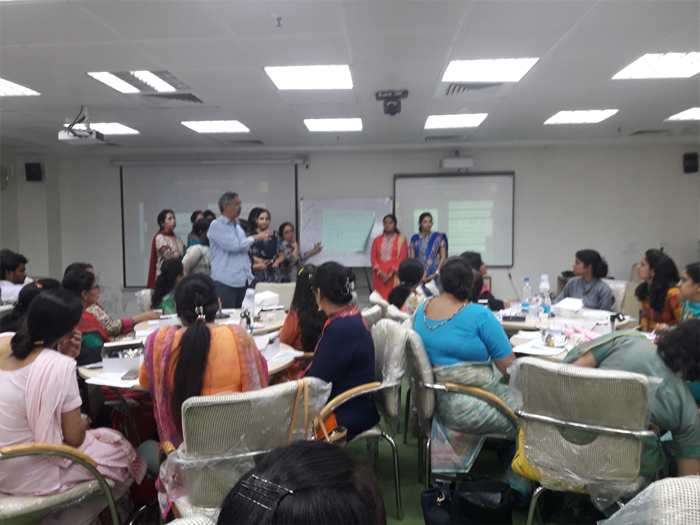Capacity Building Programme on Classroom Management-workshop for teachers by CBSE.
The Central Board of Secondary Education (CBSE) organised a two-day Capacity Building Programme on Classroom Management. The event for teachers took place at the CBSE-Centre of Excellence, Gurgaon on 25th and 26th October 2016. It was conducted by Dr. Renu Malviya and Ms. Usha Anand. Close to 55 educators from different schools around Delhi participated in the programme. From our School, Ms. P. Yogeshwari and Ms. Mehak Gumber attended the session. The participants were divided into groups of 10. The session began with an interesting activity, in which each group was asked to illustrate and present their ideal classroom on a chart paper. It was then followed by an introduction and a discussion on Classroom Management.
The session mainly focussed on the three components of Effective Classroom Management:
Content Management
Conduct Management
Covenant Management
On the first day, Content Management was discussed in detail.
[gallery link="file"]
Just as good management enhances learning by creating a good environment for teaching, similarly effective instruction contributes to a well-managed class. Proper instructions help in preventing failures, boredom and confusion in the classroom. Activities are an integral part of the teaching-learning process. Teachers must select and plan activities that result in a high level of student learning and involvement. Several management problems can occur during the transition period, and to explain this concept an activity was assigned to each group. Each group was given a situation to enact. Our situation was students have become inactive and are not willing to learn and there are still five minutes left for the class to get over.
Seating arrangements are also imperative for effective classroom management. Each one was given the task to suggest different seating arrangements and their advantages and disadvantages. One of the most important challenges for a teacher is to manage time. A table relating to time management was explained. This included four quadrants I (Important, Urgent Task), II (Important, Not Urgent Task), III (Not important but Urgent Task) and IV (Not important and Not Urgent task). One needed to identify the type of task and complete the table accordingly. Three questionnaires based on Teaching Style, Learning Style and Classroom Management Style were also given to the participants. One could easily establish a relation between these three styles.
On the following day, the topics, Conduct Management and Covenant Management were taken up.
The session started with an explanation on the difference between rules, procedures and routines. Each group was asked to design five rules for a secondary and senior secondary class. Rules are fixed principles that determine conduct. They need to be precise and clear. It is better to involve children while making classroom rules. Consequences and rewards can strengthen childrens appropriate behaviour. Each group once again enacted different situations and shared some of their experiences.
Management of the student-teacher relationship is the cornerstone of classroom management. If a teacher has a good relationship with students, then students readily accept the rules and procedures and the disciplinary action that follows their violation. The importance of building a rapport with the children was discussed. It was suggested that, at the start of every period, teachers should spend five minutes to interact with the children and build rapport. The most effective teacher-student relationships are characterised by three specific teacher behaviours -
1. Exhibiting appropriate levels of dominance
2. Exhibiting appropriate levels of cooperation
3. Being aware of high-need students
The need and importance of inclusive education was highlighted, followed by an inspiring movie.
The training session finally concluded with the distribution of certificates.
It was a fun-filled and enriching session, full of hands'-on activities for the teachers to indulge in and learn from. Teachers look forward now to applying these strategies effectively in the classroom.
Ms. Mehak Gumber.













